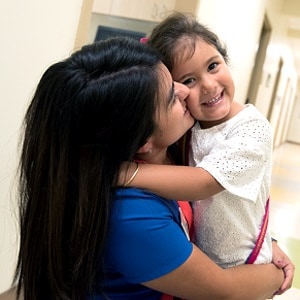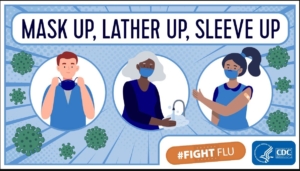AHL in the News, homepage, Acadian Care – New Orleans, Access Health Louisiana Primary Care at Pythian, Belle Chasse C.H.C, Kenner C.H.C., South Broad C.H.C, St. Bernard C.H.C., St. Charles – Norco C.H.C, St. Charles Community Health Center – Luling, St. Tammany – Slidell C.H.C, Tangipahoa C.H.C, Washington C.H.C, Woodworth C.H.C.
Children younger than 5 years old–especially those younger than 2– are at higher risk of developing serious flu-related complications. A flu vaccine offers the best defense against flu and its potentially serious consequences and also can reduce the spread of flu to others. Getting vaccinated against flu has been shown to reduce flu illnesses, doctor’s visits, missed work and school days, and reduce the risk of flu-related hospitalization and death in children. Information on this page summarizes vaccine recommendations for children. More information on vaccine benefits is available.
What Parents Need to Know About Flu

Flu is more dangerous than the common cold for children. Each year flu places a large burden on the health and well-being of children and their families.
Learn More
Flu is dangerous for children
Flu illness is more dangerous than the common cold for children. Each year, millions of children get sick with seasonal flu; thousands of children are hospitalized, and some children die from flu. Children commonly need medical care because of flu, especially children younger than 5 years old.
- Complications from flu among children in this age group can include:
- Pneumonia: an illness where the lungs get infected and inflamed
- Dehydration: when a child’s body loses too much water and salts, often because fluid losses are greater than from fluid intake)
- Worsening of long-term medical problems like heart disease or asthma
- Brain dysfunction such as encephalopathy
- Sinus problems and ear infections
- In rare cases, flu complications can lead to death.
- Flu seasons vary in severity, however every year children are at risk
- CDC estimates that from the 2010-2011 season to the 2019-2020 season, flu-related hospitalizations among children younger than 5 years old have ranged from 7,000 to 26,000 in the United States.
- While relatively rare, some children die from flu each year. From the 2004-2005 season to the 2019-2020 season, flu-related deaths in children reported to CDC during regular flu seasons have ranged from 37 to 199 deaths. (During the 2009 H1N1 pandemic, 358 pediatric flu-related deaths were reported to CDC from April 2009 to September 2010.) It is noteworthy that among reported pediatric deaths, about 80% of those children were not fully vaccinated. Also of note, even though individual flu deaths in children must be reported to CDC, it is likely that not all deaths are captured and that the number of actual deaths is higher. CDC has developed statistical models that account for the underreporting of flu-related deaths in children to estimate the actual number of deaths. During 2019-2020, for example, 199 deaths in children were reported to CDC but statistical modeling suggests approximately 434 deaths may have occurred. More information about pediatric deaths since the 2004-2005 flu season is available in the interactive flu web application.
The best way to prevent flu is with a flu vaccine. CDC recommends that everyone 6 months and older get a seasonal flu vaccine each year, ideally by the end of October. Children can get vaccinated as soon as vaccine becomes available—even if this is in July or August. However, as long as flu viruses are circulating, vaccination should continue throughout flu season, even in January or later. More information on flu vaccination timing is available below. Keep in mind that vaccination is especially important for certain people who are higher risk of developing serious flu complications or who are in close contact with higher risk persons. This includes children at higher risk of developing complications from flu illness, and adults who are close contacts of those children.
Flu vaccines are updated each season to protect against the four influenza viruses that research indicates will be most common during the upcoming season. (See Vaccine Virus Selection for this season’s vaccine composition.) This season’s vaccine has been updated from last season’s to better match circulating viruses.
Symptoms and Treatment
Symptoms
Flu symptoms include fever, cough, sore throat, runny or stuffy nose, body aches, headache, and fatigue. Some people may also have vomiting and diarrhea, which more common in children than adults. People may be infected with flu and have respiratory symptoms without a fever.
More information on when to seek emergency care is available online.
Treatment
Your child’s health care provider can help decide whether your child should take antiviral drugs if they become sick with flu. Antiviral drugs for children come in the form of pills, liquid, inhaled powder, or intravenous solution. They fight flu by keeping flu viruses from reproducing in the body. Antiviral drugs must be prescribed by a doctor — they are not available over-the-counter.
More information on children and flu antiviral drugs is available online.
Emergency Warning Signs of Flu
People experiencing these warning signs should obtain medical care right away.
In children
- Fast breathing or trouble breathing
- Bluish lips or face
- Ribs pulling in with each breath
- Chest pain
- Severe muscle pain (child refuses to walk)
- Dehydration (no urine for 8 hours, dry mouth, no tears when crying)
- Not alert or interacting when awake
- Seizures
- Fever above 104°F
- In children less than 12 weeks, any fever
- Fever or cough that improve but then return or worsen
- Worsening of chronic medical conditions
In adults
- Difficulty breathing or shortness of breath
- Persistent pain or pressure in the chest or abdomen
- Persistent dizziness, confusion, inability to arouse
- Seizures
- Not urinating
- Severe muscle pain
- Severe weakness or unsteadiness
- Fever or cough that improve but then return or worsen
- Worsening of chronic medical conditions
These lists are not all inclusive. Please consult your medical provider for any other symptom that is severe or concerning.

Some children are at higher risk
Children at greatest risk of serious flu-related complications include the following:
- Children younger than 6 months old
These children are too young to be vaccinated. The best way to protect these children is for their parents to get a flu shot during pregnancy and (after birth) for people around them to get vaccinated. A flu shot given during pregnancy has been shown to not only protect the pregnant parent from flu, but also to help protect the baby from flu infection for several months after birth, before he or she is old enough to be vaccinated. - Children aged 6 months up to their 5th birthday
From the 2010-2011 season to the 2019-2020 season, CDC estimates that flu-related hospitalizations among children younger than 5 . Even children in this age group who are otherwise healthy are at higher risk simply because of their age. Additionally, children 2 years of age up to their 5th birthday are more likely than healthy older children to be taken to a doctor, an urgent care center, or the emergency room because of flu1,2,3. To protect their health, all children 6 months and older should be vaccinated against flu each year. Vaccinating young children, their families, and other caregivers can also help protect them from getting sick. - Children aged 6 months old through 18 years old with chronic health problems, including:
- Asthma and other chronic lung diseases (such as chronic obstructive pulmonary disease [COPD] and cystic fibrosis)
- Neurologic and neurodevelopment conditions [including disorders of the brain, spinal cord, peripheral nerve, and muscle such as cerebral palsy, epilepsy (seizure disorders), stroke, intellectual disability (mental retardation), moderate to severe developmental delay, muscular dystrophy, or spinal cord injury]
- Chronic lung disease
- Heart disease (such as congenital heart disease, congestive heart failure and coronary artery disease)
- Blood disorders (such as sickle cell disease)
- Endocrine disorders (such as diabetes mellitus)
- Kidney disorders
- Liver disorders
- Metabolic disorders (such as inherited metabolic disorders and mitochondrial disorders)
- Weakened immune system due to disease or medication (such as people with HIV or AIDS, or cancer, or those on chronic steroids)Children who are taking aspirin or salicylate-containing medicines
- Extreme obesity, which has been associated with severe flu illness in some studies of adults, may also be a risk factor for children. Childhood obesity is defined as a body mass index (BMI) at or above the 95th percentile, for age and sex. Source: Centers for Disease Control (CDC)

